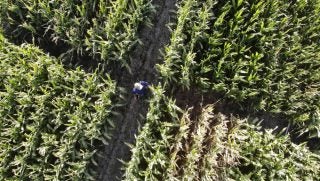This is a time when we all should take the opportunity, while kids are all being homeschooled, to teach them about agriculture and the science behind it
Anxiety turned to fear as the COVID-19 pandemic spread across the United States and Americans began to panic-buy. Shelves emptied little by little as the population was buying multiple times their usual shopping lists.
Photos of empty shelves flooded social media news feeds, and quantity limits for many goods were placed on purchases per household. I must admit, it’s a scary sight and makes one start to wonder.
Everything we once knew as normal life turned upside down.
I noticed staple foods, like milk, eggs, flour, rice and beans, were hard to find at my weekly grocery shopping. My husband and I try to be as self-sufficient as we can. I was raised with a family milk cow and we still grow a garden, keep a flock of chickens and understand the comfort in having what we need to survive on our own land.
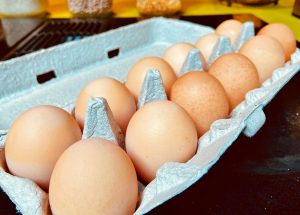
There’s been a disconnect for years that has slowly grown larger as now only 2 percent of the U.S. population is involved with agriculture.
I’ve asked kids where milk comes from and had some reply, “The store!” This has always perplexed me.
With the current pandemic infiltrating so many aspects of our lives, suddenly the nation became extra interested in the idea of food production. Why? Because in the blink of an eye, what seemed infinitely available appeared to suddenly have an end.
Maybe this is a time when we all re-evaluate and consider where our food comes from. Take the opportunity, while kids are all being homeschooled, to teach them about agriculture and the science behind it.
Farmers have realized this is an opportunity to reach and reassure concerned consumers. One example is, Appel Family Dairy in Washington state, which stepped forward to provide education to kids home from school during the coronavirus outbreak. The Appel family invited parents to video their kids asking dairy questions and the family would give a personal response with their answers.
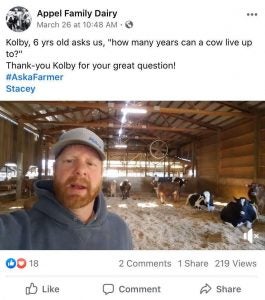
While some families feel like planning daily school lessons and work schedules at home are the biggest challenge they face, farm families are realizing every day that their future livelihood is at stake.
Some grocery stores across the country have placed limits on gallons sold per person, and with restaurants and schools being shut down, this has forced some dairies to dump milk. Dairies being hit the hardest right now are in Wisconsin.
This is the most devastating thing for a farmer to watch. It’s the feeling that all you work for every day is going down the drain, literally.
“As a dairy farmer, it’s hard to see grocery shelves being empty of milk and customers being limited to only 1 gallon of milk,” said Ann Appel. “While at the same time our Facebook feed is full of images of milk being dumped. Hard to see the logic.”
In some areas, grocery store cases of dairy are still full. Prices are plummeting off an already hard couple of years for dairy farmers. Our dairy farmers are producing milk essentially for no profit. The shift in the supply chain has occurred with schools and restaurants being shut down, meaning there is excess milk in the market.
Appel explained that, sadly, there isn’t much that can be done. She said some customers are expressing interest in buying directly from farms, but many measures are in place to prevent this.
“We get to see milk go down the drain while people go without milk,” she said.
Appel Family Dairy will likely make it through COVID-19 because their family makes cheese.
“Cheese can be stored,” she said. “Milk can’t.”
While the Appels have hope for their farm’s future and cling to their faith, many farms will have to shut their doors. But now even some cheese producers are being hit. Contracts are uneasy, and some farmers are being asked to downsize as the demand has dropped so rapidly.
It isn’t just dairy farmers being affected — many sectors in the agriculture world, like all other industries, are impacted by this virus. Hatcheries and feed stores selling chicks this spring, for example, have experienced a huge spike in sales. This speaks to the panic within communities to grow and raise their own food.
Many farmers I’ve talked with are wondering if some people will continue to garden and raise animals themselves, while others are suspecting there will be lots of chickens looking for homes when the crisis is over and people lose interest.
Last week I called several hatcheries in the Midwest to order some laying hens to add to my existing flock, only to find that some breeds were back ordered into August.
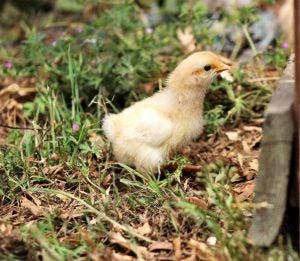
At a time of year when chick sales typically increase, approaching Easter, chick sales this spring have skyrocketed above their average increase, and even at local feed stores they are hard to find.
Lauren Johnson has worked for Skagit Farmers Supply for the past 13 years and says this year is one for the books.
“We have sold out of chicks within hours of receiving them,” she said. “Customers are calling daily to check on the status of orders, they have been lining up outside before we open.”
Johnson observed that requests for not only egg layers, but meat birds as well, are up far more than average.
Growers and garden seed companies are backlogged at least a couple of weeks, so hardware stores and farm supply companies have run low or out of stock in places.
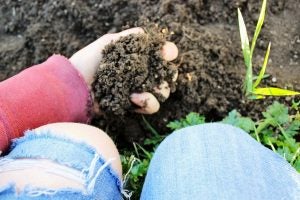
So the question remains, what parts of our daily lives will forever be changed by COVID-19?
As of now, it is unknown. Our nation’s leaders and scientists are pressing forward for a cure, for a vaccine, for knowledge.
Despite the highs and lows within each agricultural industry, one truth remains, farmers are still feeding us and always will.
We must remember there is enough food for everyone. Farmers are working the same hours they always have and truck drivers and grocery distributors are working endless hours to make sure that food makes it to the shelves and to your family’s table.
“As a farmer, we always have work to do. Always a reason to get out of bed and go to work,” Appel said. “Even if our milk goes down the drain, we still have animals to take care of.”
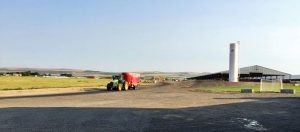
As we patiently wait for the world to return to what we knew, lets cling to our families, faith, and thank those behind the scenes.
Without the truck driver, grocery store clerk, and our farmers, we could not be sheltering in our homes comfortably.
One thing I’ve learned from farmers is to always keep your head up. I’ve seen farmers struggling to keep their farm going, losing money day in and day out and they still have a smile on their face. There is something inside them that says to keep going and to press on.
Farmers are on a front line all their own, each day producing the quality food needed to sustain the people who make up this great nation.
So we can have hope, because the American farmer will not give up, and neither should we.
Aleah Bright-Kasch is a hobby farmer who was born and raised in Washington state and grew up showing Jersey cattle in 4-H. Aleah is enthusiastic about sharing her passion for agriculture and inspiring the future generations of American farmers.

